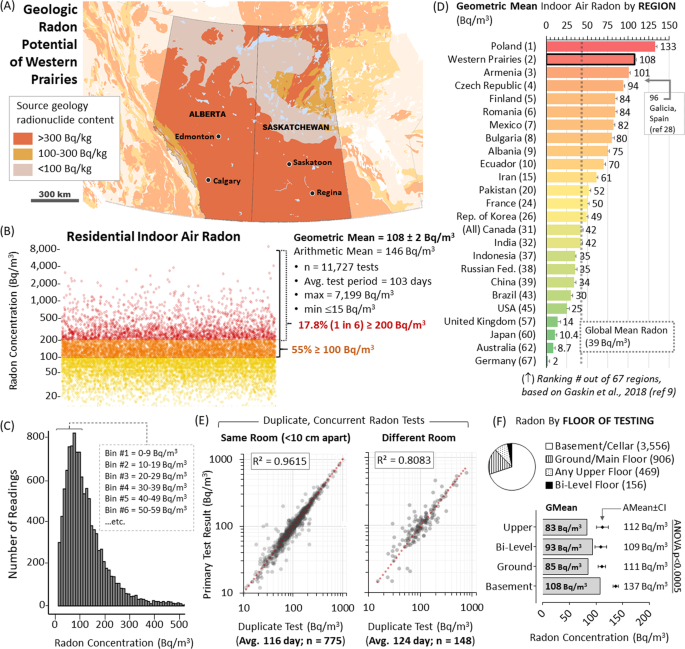Radiation Security
Is radon really bad for you?

Breathing radon over time increases your risk of lung cancer. Radon is the second leading cause of lung cancer in the United States. Nationally, the EPA estimates that about 21,000 people die each year from radon-related lung cancer. Only smoking causes more lung cancer deaths.
The event dramatized the fact that radon degrees in particular residences can periodically be orders of magnitude more than normal. Radon quickly ended up being a standard homeowner concern, though common residential exposures are two to three orders of size lower (100 Bq/m3, or 2.5 pCi/L), making individual screening necessary to assessment of radon danger in any type of particular house. Radon doesn't create itchy eyes or sprinkling noses, however it does harm your lungs with time. Long-term direct exposure throughout years, even if radon levels increase as well as drop with time, dramatically raises your chances of creating lung cancer cells. Considering that you're investing hours at once in your house breathing in the air, you're going to absorb lots of radon as you cook, wash, and also rest if it exists in the house's air supply.
Radon in the air is taken into consideration to be a bigger health risk than radon in domestic water so the US Environmental Protection Agency referral is to not test for radon in water unless a radon in air examination is above the action level. However, some US states, such as Maine where radon degrees are more than the national standard, suggest all well water should be checked for radon. The United States government has not establish an action level for radon in water.
Is radon mitigation really necessary?
When radon gas enters the body, it exposes the lungs to small amounts of radiation. In small quantities, experts say this is harmless. However, in persistent exposures or larger quantities, radon can damage the cells of the lining of the lungs, increasing a person's chance of developing lung cancer.
This does not suggest that a degree listed below 4.0 pCi/L is thought about acceptable, as stated in the BEIR VI research. It is approximated that a decrease of radon levels to listed below 2 pCi/L nationwide would likely decrease the annual lung cancer deaths credited to radon by 50%. Nevertheless, even with an activity level of 2.0 pCi/L, the cancer danger provided by radon gas is still numerous times above the dangers enabled carcinogens in our food as well as water.
- Your danger of lung cancer enhances considerably with exposure to higher radon levels.
- Lung cancer cells risk climbs 16% per 2.7 pCi/L boost in radon direct exposure.
- Radon gas is a naturally-occurring by-product of the radioactive degeneration of Uranium in the dirt.
- Relying on your geographical location, the radon levels of the air you breathe beyond your house might be as high as 0.75 pCi/L.
- The US EPA has placed it clearly, mentioning, "Any type of radon exposure has some threat of creating lung cancer.
How do you eliminate radon?
Possible symptoms include shortness of breath (difficulty breathing), a new or worsening cough, pain or tightness in the chest, hoarseness, or trouble swallowing. If you smoke and you know you've been exposed to high levels of radon, it's very important to quit smoking.
Things to bear in mind is that the risk for lung cancer from radon is arbitrary as well as defies stats. Individuals might be revealed for a life time at really high degrees without obtaining lung cancer cells, while others may be revealed at modest levels for a year or 2 and agreement lung cancer. Radon is just one of the few ecological hazards we have some control over. Many people fear that if a radon test shows high levels in a particular residence, that the house is somehow tainted as well as decreased the value of.
Health and wellness
Since you angle see or scent radon, you angle know whether your home has undesirable degrees of the gas unless you have the air evaluated. Nevertheless, if tests show that radon is placing you as well as your family at risk, you can take some easy actions to clarify.
How long does it take for radon to cause cancer?
Fact: You will reduce your risk of lung cancer when you reduce radon levels, even if you've lived with an elevated radon level for a long time. Keep in mind that radon levels below 4 https://radon1.com/who-else-wants-to-learn-about-radon-testing-kit-knoxville/ pCi/L still pose some risk and that radon levels can be reduced to 2 pCi/L or below in most homes.